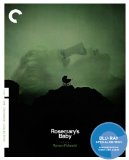| Reviews & Columns |
|
Reviews DVD TV on DVD Blu-ray 4K UHD International DVDs In Theaters Reviews by Studio Video Games Features Collector Series DVDs Easter Egg Database Interviews DVD Talk Radio Feature Articles Columns Anime Talk DVD Savant Horror DVDs The M.O.D. Squad Art House HD Talk Silent DVD
|
DVD Talk Forum |
|
|
| Resources |
|
DVD Price Search Customer Service #'s RCE Info Links |
|
Columns
|
|
|
Rosemary's Baby: The Criterion Collection
The Criterion Collection // R // October 30, 2012
List Price: $39.95 [Buy now and save at Amazon]
The Film:
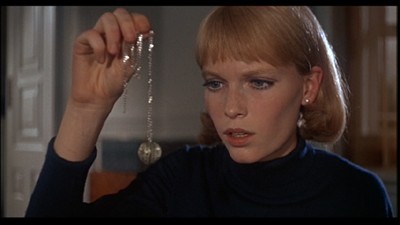 Time and time again, Rosemary's Baby always seems to worm its way into one's stomach and slither around persistently for its morbid two-hour-plus duration. Tapping into unsettling factors that hit close to home -- dubious neighbors, an emotionally-distant spouse, and the nature of knowing who to trust about the wayward biology of pregnancy -- Roman Polanski's first foray into Hollywood fare exploits the inherent unease of domesticity, its sinister essence intensifying the more it touches on homegrown fears. Pitch-black satire about starting a new life with a beloved person churns at its core, heavily blended with a critical outlook on show-business and clouding rational judgment with old wives' tales. That's all part of its sick brilliance, and it hits a fever pitch once the story plummets into the backwards maze of deduction, demon-worshipping witches, and psychological angst that's made it a proverbial name among the genre's greats and, thematically speaking, still remains quite relevant.
Time and time again, Rosemary's Baby always seems to worm its way into one's stomach and slither around persistently for its morbid two-hour-plus duration. Tapping into unsettling factors that hit close to home -- dubious neighbors, an emotionally-distant spouse, and the nature of knowing who to trust about the wayward biology of pregnancy -- Roman Polanski's first foray into Hollywood fare exploits the inherent unease of domesticity, its sinister essence intensifying the more it touches on homegrown fears. Pitch-black satire about starting a new life with a beloved person churns at its core, heavily blended with a critical outlook on show-business and clouding rational judgment with old wives' tales. That's all part of its sick brilliance, and it hits a fever pitch once the story plummets into the backwards maze of deduction, demon-worshipping witches, and psychological angst that's made it a proverbial name among the genre's greats and, thematically speaking, still remains quite relevant.
Wearing both writer and director hats, Polanski reverentially adapts Ira Levin's book of the same name, keeping the viewpoint perpetually locked onto the young woman whose name adorns the title. Following a swirling shot of rooftops in New York, it starts with housewife Rosemary Woodhouse (Mia Farrow) and her mildly-successful actor husband, Guy (John Cassavetes), touring a striking apartment that's recently come available. It's an open, distinctive fixer-upper in a building with a storied history; people have died in unusual ways, at least one tied to witchcraft. Considering the building's proximity to the acting scene, however, the young couple, ready to settle down and have a child, decide to take it. They discover that there's more to the place they weren't aware of: the Castevets, the old, nosy, unusual couple next door, start creeping into their lives, getting worse once Rosemary and Guy plan to have their first baby. Then, there are those strange sounds coming from their neighbors' apartment ...
Polanski gives Rosemary's Baby a faintly avant-garde style reminiscent of other late-'60s independent cinema through William Fraker's lens, possessing notes of the internal drama and claustrophobia of Repulsion alongside occasional verite sequences that reminded me of, interestingly enough, John Cassavetes' provocative dramas. The apartment becomes a bit maze-like as Rosemary moves about the rooms and answers the door for her meddlesome neighbor, Minnie (a superb Academy Award-winning performance from Ruth Gordon); the seeds are planted for this setting to close in on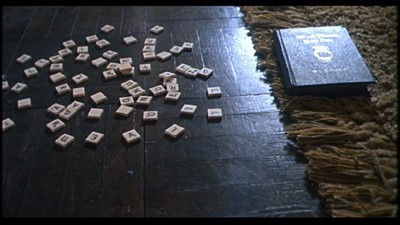 her comfort zone, even though it's vibrant and spacious at first. Polanski isn't afraid of experimentation though, evidenced by dream sequences involving puffs of green smoke, yachting trips where people's faces change, and the deep, dark gaze of an ominous red figure. The eve of Rosemary's impregnation garners the lion's share of these incoherent, emblematic images coursing through her mind, captured in a whirlwind of naked bodies and dark shadows. Stillness is deceiving, and the darkness incredibly distressing.
her comfort zone, even though it's vibrant and spacious at first. Polanski isn't afraid of experimentation though, evidenced by dream sequences involving puffs of green smoke, yachting trips where people's faces change, and the deep, dark gaze of an ominous red figure. The eve of Rosemary's impregnation garners the lion's share of these incoherent, emblematic images coursing through her mind, captured in a whirlwind of naked bodies and dark shadows. Stillness is deceiving, and the darkness incredibly distressing.
Those earlier moments in Rosemary's Baby generate plenty of suspicion and curiosity, about fluke deaths, the foul odor of a good-luck charm, and eerie sounds of chanting, but only once Rosemary becomes pregnant does it embark on one of the most cunning crescendos of suspense captured on film. The point-of-view perpetually centers on the young mother-to-be, which deviously allows Polanski to reveal very little about what's going on outside her field of vision; conversations in smoky rooms outside her earshot and the composition of treatments prepared for Rosemary's well-being are conveniently, and craftily, left unbeknownst to her. We're the bystanders, the people yelling for her to look closer at what's going on around her as the mystery takes shape, yet she can't hear those calls. Warning sign after warning sign arouse her suspicion, yet her concern over her baby's health -- and the validity of those instructing her to follow certain instructions -- leads to a relentlessly unnerving psychological conflict between instinctual distrust and the persuasive words of those who "know better".
Mia Farrow undergoes a disarming transforming in Rosemary's Baby, arguably the most "horrific" thing about the film. The woman we see at the beginning of the film is a vibrant, hopeful girl with a sublime glow to her appearance, adorned with playful blonde hair and the dutiful disposition of a fulfilled housewife. As the film progresses further into darker territory, and the unsettling factors surrounding her pregnancy (and her husband's sudden burgeoning success) become consuming, her appearance descends into a disturbingly gaunt and desperate visage that's given weight by the mounting frailty in Farrow's performance.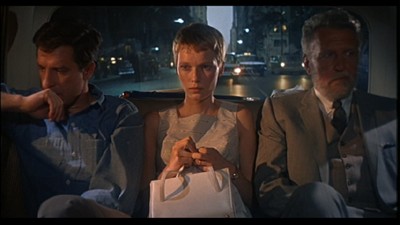 Rosemary represents a girl who's both reasonably intelligent and easily manipulated, a tough balance, but Farrow pale-faced, bone-protruding visage -- complete with a drastic change in hairstyle to a pixie cut, a byproduct of her Peyton Place character's emotional shift -- discovers desperation and closeted agony that fit snugly into that complex space. This hits a staggering, sickening peak the first time she feels her baby kick.
Rosemary represents a girl who's both reasonably intelligent and easily manipulated, a tough balance, but Farrow pale-faced, bone-protruding visage -- complete with a drastic change in hairstyle to a pixie cut, a byproduct of her Peyton Place character's emotional shift -- discovers desperation and closeted agony that fit snugly into that complex space. This hits a staggering, sickening peak the first time she feels her baby kick.
Rosemary's Baby slowly transforms into this mesmerizing exercise of horrific non-horror as her condition progresses, turning a critical and darkly-comic eye on the perplexing details of pregnancy and the self-absorbed nature of those in show-business. That fascination derives from the almost Hichcockian way Rosemary puts the pieces together and begins to fear for her and her baby's safety; her suspicion, driven by worrisome phone calls and digging through books, creates palpable speculation over what's physically happened to her and why her once-loving husband appears so distant and coarse. Polanski lets those details linger in sequences where Rosemary's mind wraps around the details, letting them hang in the air as our own awareness slowly merges with hers. All that gut-churning is done by showing next-to-nothing that's even remotely gruesome or resembling a typical jump-scare, or even concretely confirming or denying anything until it's absolutely necessary -- the pure anxiety over the presupposed plot surrounding Rosemary creating its own belly full of slugs.
At this point, after having experienced Rosemary's Baby several times over the years, it's a tricky endeavor to figure out exactly what details are observable suggestions to fresh eyes that hint at the upcoming conclusion, and which ones remain mysteries until after a second viewing. Polanski arranges these pieces of the puzzle in plain sight, snapping together into a baffling, ill-omened finale that leads all the horror elements to a fine point -- and then skillfully bleeds into a semi-ambiguous ending, leaving the director's mark with a disquieting expression of maternal instinct. The ominous power of that final scene is undeniable: it's the culmination of bizarre vitamin drinks and instructions not to read books that guides a confused, addled mother into a space where she can't figure out which direction is up or down, ensuring that nothing will ever be as that lively, doe-eyed girl at the beginning had planned. And the entire time, each and every time Rosemary's Baby is watched, that persistent heavy feeling Polanski so indelibly concocts will make those watching want to ceaselessly shake her and warn her otherwise.
The Blu-ray:
The Criterion Collection offer a welcome surprise for someone laying their eyes on the cover of Rosemary's Baby: they've taken the original poster artwork and tweaked it, very simply, by using the same font to finish off the title and director label they routinely place on their covers. It's a beautiful thing, and it carries over into the blue-tinted inner artwork that features a capture from the film's New York rooftop footage. A thick, elegantly-designed Booklet included inside the standard clear case contains the following: the essay "It's Alive" from Ed Parks; a passage from Ira Levin entitled "Stuck With Satan", which originally appeared in a 2003 library edition of Rosemary's Baby; and rare character sketches and an apartment diagram "From the Notebook of Ira Levin".
Video and Audio:
Indicated by even the first shots of Rosemary and Guy entering the apartment for their first glimpse of their new living space, this high-definition treatment from The Criterion Collection cradles William Fraker's 1.85:1-framed cinematography with an incredible amount of concentration. The 4K-resolution master -- derived from scanning the original 35mm negative through their routine Scanity process and wheeled out in a fine AVC encode -- possesses depth, richness, and detail that breathe new life into the cinematography. The grain structure here looks phenomenal; the photography's depth pours through a veil of elegant film texture, mindfully growing heavier at times with certain aesthetic choices (especially the dream sequences). Close-ups reveal both supple and pale tones against Mia Farrow's skin, while the subtle textures in her garments and the fine detail in the tanas root necklace shine a light on fine detail presentation. Occasionally, the film defaults to a softer, slight out-of-focus appearance that could reach beyond the cinematography's aims, but the shadows, lights, and horror in Farrow's face look exquisite.
This uncompressed monaural track is a real treat, too. Taken from the 35mm magnetic track and sent through ProToolsHD to smooth out the hiss and blips, it's amazing how clean and quiet the film can be during its quintessential hushed moments. The subtle ticking of a clock and the distant sounds of chanting through a wall are impeccably clear, with next-to-no reflection of the film's age hanging in the silence. Dialogue can't avoid sounding a little bit metallic and thin in its vintage, but it's consistently razor-sharp and possessing rich lower-end components in Cassavetes' masculine presence and Farrow's more alto-poised moments. Other subtle sound effects succinctly envelop the audience for their brief duration: the clatter and sliding of Scrabble tiles on a hardwood floor, a steak sizzling on a skillet, and distant car horns on the New York streets. Krzysztof Komeda's score sounds tremendously balanced alongside those elements, as well. It's a fine, fine treatment.
Special Features:
Remembering Rosemary's Baby (46:54, HD):
Roman Polanski, Mia Farrow, and producer Robert Evans tells the story of making Rosemary's Baby with warmth and self-effacing casualness in these interviews recorded specifically for The Criteiron Collection in 2012, and you'll be treated with the occasional archival layout from Ira Levin's notebook and some behind-the-scenes footage. A laid-back rhythm makes the whole piece feel very comfortable as they discuss Polanski's schedule and budget issues, his peculiar directorial slant, and casting Mia Farrow. They tell some familiar but terrific stories from their own point of view, such as: how the film led to the divorce of Farrow and Frank Sinatra (and what happened the day she received the divorce papers); how John Cassavetes' filmmaking style conflicted with Polanski's (and apparently, how he was occasionally a pain); and which of the more risqué parts involve a body double for Farrow. You'll also get to hear their insights on the costumes, production elements, their individual outlooks on the conclusion (Polanski as an Agnostic, Farrow as a Catholic), and the final, brilliant poster -- all in relaxed and detailed conversational fashion. It's pretty fantastic.
Two more supplements accompany Criterion's presentation, starting with Ira Levin and Leonard Lopate (19:21, HD), where Levin discusses Rosemary's Baby in tandem with his follow-up novel, Son of Rosemary. The conversation takes a highly religious slant, involving his fascination with Satan and his guilt over making him more "mainstream" as well as his fascination with puzzles in the narrative. On top of that, a substantial, feature-length documentary from 2012 on Krzysztof Komeda, entitled Komeda Komeda (1:10:43, HD), rounds out the rest of the extras available. Fans of the film might want to hold onto their DVD copies of the film, though, for the twenty-three minute making-of featurette and the older interviews.
Final Thoughts:
You don't get more quintessential than Rosemary's Baby, Roman Polanski's ominous, entrancing depiction of a young mother-to-be surrounded by suspicion, malignant advice, and the occult. I watched the film twice while covering this Blu-ray, and both times left me equally as gripped and heavy-chested as they did when I first experienced it in college many years ago, drawing me once again into the thick atmosphere and sustained suspense. Gore, gimmicks, and visual grotesqueness aren't the tools being utilized here; instead, this adaptation of Ira Levin's book exploits human fears in a psychologically provocative environment that's free of easy scares. Driven by a captivating performance from Mia Farrow that bolsters the natural horror bubbling at the center, it's a nearly immaculate, shiver-inducing classic that's essentially responsible for spurning a new sub-genre for how well it delivers on the premise.
The Criterion Collection once again deliver the goods with their Blu-ray, too: exceptional audiovisual properties present the film in such a rich, involving, authentic fashion that it'll feel like watching the movie for the first time, and the newly-recorded interviews enrich that experience by touching on some of those newly-elucidated details. Sure, I'd love to have a trailer and the special features from the old DVD on this disc, but you really don't stumble across more of a no-brainer than this superb Blu-ray treatment of an essential classic. DVDTalk Collector's Series.
Note: Screenshots in this review are from Paramount's DVD release of Rosemary's Baby.
Thomas Spurlin, Staff Reviewer -- DVDTalk Reviews | Personal Blog/Site
 Time and time again, Rosemary's Baby always seems to worm its way into one's stomach and slither around persistently for its morbid two-hour-plus duration. Tapping into unsettling factors that hit close to home -- dubious neighbors, an emotionally-distant spouse, and the nature of knowing who to trust about the wayward biology of pregnancy -- Roman Polanski's first foray into Hollywood fare exploits the inherent unease of domesticity, its sinister essence intensifying the more it touches on homegrown fears. Pitch-black satire about starting a new life with a beloved person churns at its core, heavily blended with a critical outlook on show-business and clouding rational judgment with old wives' tales. That's all part of its sick brilliance, and it hits a fever pitch once the story plummets into the backwards maze of deduction, demon-worshipping witches, and psychological angst that's made it a proverbial name among the genre's greats and, thematically speaking, still remains quite relevant.
Time and time again, Rosemary's Baby always seems to worm its way into one's stomach and slither around persistently for its morbid two-hour-plus duration. Tapping into unsettling factors that hit close to home -- dubious neighbors, an emotionally-distant spouse, and the nature of knowing who to trust about the wayward biology of pregnancy -- Roman Polanski's first foray into Hollywood fare exploits the inherent unease of domesticity, its sinister essence intensifying the more it touches on homegrown fears. Pitch-black satire about starting a new life with a beloved person churns at its core, heavily blended with a critical outlook on show-business and clouding rational judgment with old wives' tales. That's all part of its sick brilliance, and it hits a fever pitch once the story plummets into the backwards maze of deduction, demon-worshipping witches, and psychological angst that's made it a proverbial name among the genre's greats and, thematically speaking, still remains quite relevant. Wearing both writer and director hats, Polanski reverentially adapts Ira Levin's book of the same name, keeping the viewpoint perpetually locked onto the young woman whose name adorns the title. Following a swirling shot of rooftops in New York, it starts with housewife Rosemary Woodhouse (Mia Farrow) and her mildly-successful actor husband, Guy (John Cassavetes), touring a striking apartment that's recently come available. It's an open, distinctive fixer-upper in a building with a storied history; people have died in unusual ways, at least one tied to witchcraft. Considering the building's proximity to the acting scene, however, the young couple, ready to settle down and have a child, decide to take it. They discover that there's more to the place they weren't aware of: the Castevets, the old, nosy, unusual couple next door, start creeping into their lives, getting worse once Rosemary and Guy plan to have their first baby. Then, there are those strange sounds coming from their neighbors' apartment ...
Polanski gives Rosemary's Baby a faintly avant-garde style reminiscent of other late-'60s independent cinema through William Fraker's lens, possessing notes of the internal drama and claustrophobia of Repulsion alongside occasional verite sequences that reminded me of, interestingly enough, John Cassavetes' provocative dramas. The apartment becomes a bit maze-like as Rosemary moves about the rooms and answers the door for her meddlesome neighbor, Minnie (a superb Academy Award-winning performance from Ruth Gordon); the seeds are planted for this setting to close in on
 her comfort zone, even though it's vibrant and spacious at first. Polanski isn't afraid of experimentation though, evidenced by dream sequences involving puffs of green smoke, yachting trips where people's faces change, and the deep, dark gaze of an ominous red figure. The eve of Rosemary's impregnation garners the lion's share of these incoherent, emblematic images coursing through her mind, captured in a whirlwind of naked bodies and dark shadows. Stillness is deceiving, and the darkness incredibly distressing.
her comfort zone, even though it's vibrant and spacious at first. Polanski isn't afraid of experimentation though, evidenced by dream sequences involving puffs of green smoke, yachting trips where people's faces change, and the deep, dark gaze of an ominous red figure. The eve of Rosemary's impregnation garners the lion's share of these incoherent, emblematic images coursing through her mind, captured in a whirlwind of naked bodies and dark shadows. Stillness is deceiving, and the darkness incredibly distressing. Those earlier moments in Rosemary's Baby generate plenty of suspicion and curiosity, about fluke deaths, the foul odor of a good-luck charm, and eerie sounds of chanting, but only once Rosemary becomes pregnant does it embark on one of the most cunning crescendos of suspense captured on film. The point-of-view perpetually centers on the young mother-to-be, which deviously allows Polanski to reveal very little about what's going on outside her field of vision; conversations in smoky rooms outside her earshot and the composition of treatments prepared for Rosemary's well-being are conveniently, and craftily, left unbeknownst to her. We're the bystanders, the people yelling for her to look closer at what's going on around her as the mystery takes shape, yet she can't hear those calls. Warning sign after warning sign arouse her suspicion, yet her concern over her baby's health -- and the validity of those instructing her to follow certain instructions -- leads to a relentlessly unnerving psychological conflict between instinctual distrust and the persuasive words of those who "know better".
Mia Farrow undergoes a disarming transforming in Rosemary's Baby, arguably the most "horrific" thing about the film. The woman we see at the beginning of the film is a vibrant, hopeful girl with a sublime glow to her appearance, adorned with playful blonde hair and the dutiful disposition of a fulfilled housewife. As the film progresses further into darker territory, and the unsettling factors surrounding her pregnancy (and her husband's sudden burgeoning success) become consuming, her appearance descends into a disturbingly gaunt and desperate visage that's given weight by the mounting frailty in Farrow's performance.
 Rosemary represents a girl who's both reasonably intelligent and easily manipulated, a tough balance, but Farrow pale-faced, bone-protruding visage -- complete with a drastic change in hairstyle to a pixie cut, a byproduct of her Peyton Place character's emotional shift -- discovers desperation and closeted agony that fit snugly into that complex space. This hits a staggering, sickening peak the first time she feels her baby kick.
Rosemary represents a girl who's both reasonably intelligent and easily manipulated, a tough balance, but Farrow pale-faced, bone-protruding visage -- complete with a drastic change in hairstyle to a pixie cut, a byproduct of her Peyton Place character's emotional shift -- discovers desperation and closeted agony that fit snugly into that complex space. This hits a staggering, sickening peak the first time she feels her baby kick. Rosemary's Baby slowly transforms into this mesmerizing exercise of horrific non-horror as her condition progresses, turning a critical and darkly-comic eye on the perplexing details of pregnancy and the self-absorbed nature of those in show-business. That fascination derives from the almost Hichcockian way Rosemary puts the pieces together and begins to fear for her and her baby's safety; her suspicion, driven by worrisome phone calls and digging through books, creates palpable speculation over what's physically happened to her and why her once-loving husband appears so distant and coarse. Polanski lets those details linger in sequences where Rosemary's mind wraps around the details, letting them hang in the air as our own awareness slowly merges with hers. All that gut-churning is done by showing next-to-nothing that's even remotely gruesome or resembling a typical jump-scare, or even concretely confirming or denying anything until it's absolutely necessary -- the pure anxiety over the presupposed plot surrounding Rosemary creating its own belly full of slugs.
At this point, after having experienced Rosemary's Baby several times over the years, it's a tricky endeavor to figure out exactly what details are observable suggestions to fresh eyes that hint at the upcoming conclusion, and which ones remain mysteries until after a second viewing. Polanski arranges these pieces of the puzzle in plain sight, snapping together into a baffling, ill-omened finale that leads all the horror elements to a fine point -- and then skillfully bleeds into a semi-ambiguous ending, leaving the director's mark with a disquieting expression of maternal instinct. The ominous power of that final scene is undeniable: it's the culmination of bizarre vitamin drinks and instructions not to read books that guides a confused, addled mother into a space where she can't figure out which direction is up or down, ensuring that nothing will ever be as that lively, doe-eyed girl at the beginning had planned. And the entire time, each and every time Rosemary's Baby is watched, that persistent heavy feeling Polanski so indelibly concocts will make those watching want to ceaselessly shake her and warn her otherwise.
The Blu-ray:
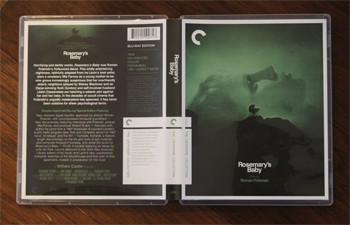 | 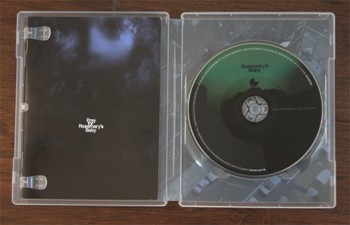 |
The Criterion Collection offer a welcome surprise for someone laying their eyes on the cover of Rosemary's Baby: they've taken the original poster artwork and tweaked it, very simply, by using the same font to finish off the title and director label they routinely place on their covers. It's a beautiful thing, and it carries over into the blue-tinted inner artwork that features a capture from the film's New York rooftop footage. A thick, elegantly-designed Booklet included inside the standard clear case contains the following: the essay "It's Alive" from Ed Parks; a passage from Ira Levin entitled "Stuck With Satan", which originally appeared in a 2003 library edition of Rosemary's Baby; and rare character sketches and an apartment diagram "From the Notebook of Ira Levin".
Video and Audio:
Indicated by even the first shots of Rosemary and Guy entering the apartment for their first glimpse of their new living space, this high-definition treatment from The Criterion Collection cradles William Fraker's 1.85:1-framed cinematography with an incredible amount of concentration. The 4K-resolution master -- derived from scanning the original 35mm negative through their routine Scanity process and wheeled out in a fine AVC encode -- possesses depth, richness, and detail that breathe new life into the cinematography. The grain structure here looks phenomenal; the photography's depth pours through a veil of elegant film texture, mindfully growing heavier at times with certain aesthetic choices (especially the dream sequences). Close-ups reveal both supple and pale tones against Mia Farrow's skin, while the subtle textures in her garments and the fine detail in the tanas root necklace shine a light on fine detail presentation. Occasionally, the film defaults to a softer, slight out-of-focus appearance that could reach beyond the cinematography's aims, but the shadows, lights, and horror in Farrow's face look exquisite.
This uncompressed monaural track is a real treat, too. Taken from the 35mm magnetic track and sent through ProToolsHD to smooth out the hiss and blips, it's amazing how clean and quiet the film can be during its quintessential hushed moments. The subtle ticking of a clock and the distant sounds of chanting through a wall are impeccably clear, with next-to-no reflection of the film's age hanging in the silence. Dialogue can't avoid sounding a little bit metallic and thin in its vintage, but it's consistently razor-sharp and possessing rich lower-end components in Cassavetes' masculine presence and Farrow's more alto-poised moments. Other subtle sound effects succinctly envelop the audience for their brief duration: the clatter and sliding of Scrabble tiles on a hardwood floor, a steak sizzling on a skillet, and distant car horns on the New York streets. Krzysztof Komeda's score sounds tremendously balanced alongside those elements, as well. It's a fine, fine treatment.
Special Features:
Remembering Rosemary's Baby (46:54, HD):
Roman Polanski, Mia Farrow, and producer Robert Evans tells the story of making Rosemary's Baby with warmth and self-effacing casualness in these interviews recorded specifically for The Criteiron Collection in 2012, and you'll be treated with the occasional archival layout from Ira Levin's notebook and some behind-the-scenes footage. A laid-back rhythm makes the whole piece feel very comfortable as they discuss Polanski's schedule and budget issues, his peculiar directorial slant, and casting Mia Farrow. They tell some familiar but terrific stories from their own point of view, such as: how the film led to the divorce of Farrow and Frank Sinatra (and what happened the day she received the divorce papers); how John Cassavetes' filmmaking style conflicted with Polanski's (and apparently, how he was occasionally a pain); and which of the more risqué parts involve a body double for Farrow. You'll also get to hear their insights on the costumes, production elements, their individual outlooks on the conclusion (Polanski as an Agnostic, Farrow as a Catholic), and the final, brilliant poster -- all in relaxed and detailed conversational fashion. It's pretty fantastic.
Two more supplements accompany Criterion's presentation, starting with Ira Levin and Leonard Lopate (19:21, HD), where Levin discusses Rosemary's Baby in tandem with his follow-up novel, Son of Rosemary. The conversation takes a highly religious slant, involving his fascination with Satan and his guilt over making him more "mainstream" as well as his fascination with puzzles in the narrative. On top of that, a substantial, feature-length documentary from 2012 on Krzysztof Komeda, entitled Komeda Komeda (1:10:43, HD), rounds out the rest of the extras available. Fans of the film might want to hold onto their DVD copies of the film, though, for the twenty-three minute making-of featurette and the older interviews.
Final Thoughts:
You don't get more quintessential than Rosemary's Baby, Roman Polanski's ominous, entrancing depiction of a young mother-to-be surrounded by suspicion, malignant advice, and the occult. I watched the film twice while covering this Blu-ray, and both times left me equally as gripped and heavy-chested as they did when I first experienced it in college many years ago, drawing me once again into the thick atmosphere and sustained suspense. Gore, gimmicks, and visual grotesqueness aren't the tools being utilized here; instead, this adaptation of Ira Levin's book exploits human fears in a psychologically provocative environment that's free of easy scares. Driven by a captivating performance from Mia Farrow that bolsters the natural horror bubbling at the center, it's a nearly immaculate, shiver-inducing classic that's essentially responsible for spurning a new sub-genre for how well it delivers on the premise.
The Criterion Collection once again deliver the goods with their Blu-ray, too: exceptional audiovisual properties present the film in such a rich, involving, authentic fashion that it'll feel like watching the movie for the first time, and the newly-recorded interviews enrich that experience by touching on some of those newly-elucidated details. Sure, I'd love to have a trailer and the special features from the old DVD on this disc, but you really don't stumble across more of a no-brainer than this superb Blu-ray treatment of an essential classic. DVDTalk Collector's Series.
|
| Popular Reviews |
| Sponsored Links |
|
|
| Sponsored Links |
|
|
| Release List | Reviews | Shop | Newsletter | Forum | DVD Giveaways | Blu-Ray | Advertise |
|
Copyright 2024 DVDTalk.com All Rights Reserved. Legal Info, Privacy Policy, Terms of Use,
Manage Preferences,
Your Privacy Choices | |||||||









